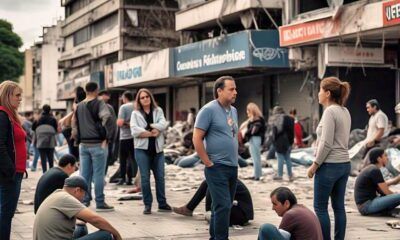INTERNACIONAL
Venezuelan planes sent to US for deportation flights return to country with nearly 200 deportees

Two planes sent by Venezuela returned home Monday with nearly 200 Venezuelans who were in the U.S. illegally as part of President Donald Trump’s mass deportation plan.
The 190 migrants returned to Venezuela signals a possible ease in tensions between the two longtime adversaries and a win for the Trump administration as it seeks to have countries take back their citizens found in the U.S. without authorization.
The Conviasa airline flights arrived in the Venezuelan capital of Caracas from Fort Bliss, a U.S. Army base in El Paso, Texas.
«Two planes of illegal immigrants left El Paso today headed to Venezuela – paid for by the Venezuelans,» Trump envoy Richard Grennell, who oversaw the deportations, wrote on X.
FEDERAL COURT BLOCKS TRUMP ADMIN FROM SENDING DETAINED VENEZUELAN IMMIGRANTS TO GUANTÁNAMO BAY
Two planes sent by Venezuela returned to the country from El Paso, Texas, on Monday with nearly 200 Venezuelans who were in the U.S. illegally. (AP)
Deportation flights from the U.S. to Venezuela had been stopped for years, except for a brief period in October 2023 under the Biden administration.
Large numbers of Venezuelans began arriving at the southern border in 2021 and are still among the nationalities with the most people entering the U.S. illegally, which has made Venezuela’s refusal to accept their return a major hurdle.
Venezuela’s newfound willingness to take back the migrants came after Grennell visited Caracas a few weeks ago.
«This is the world we want, a world of peace, understanding, dialogue and cooperation,» Venezuelan President Nicolás Maduro said.
TRUMP DEPORTING CRIMINAL ALIENS TO GUANTANAMO BAY: MEET THE HARDENED TERRORISTS THEY’LL JOIN
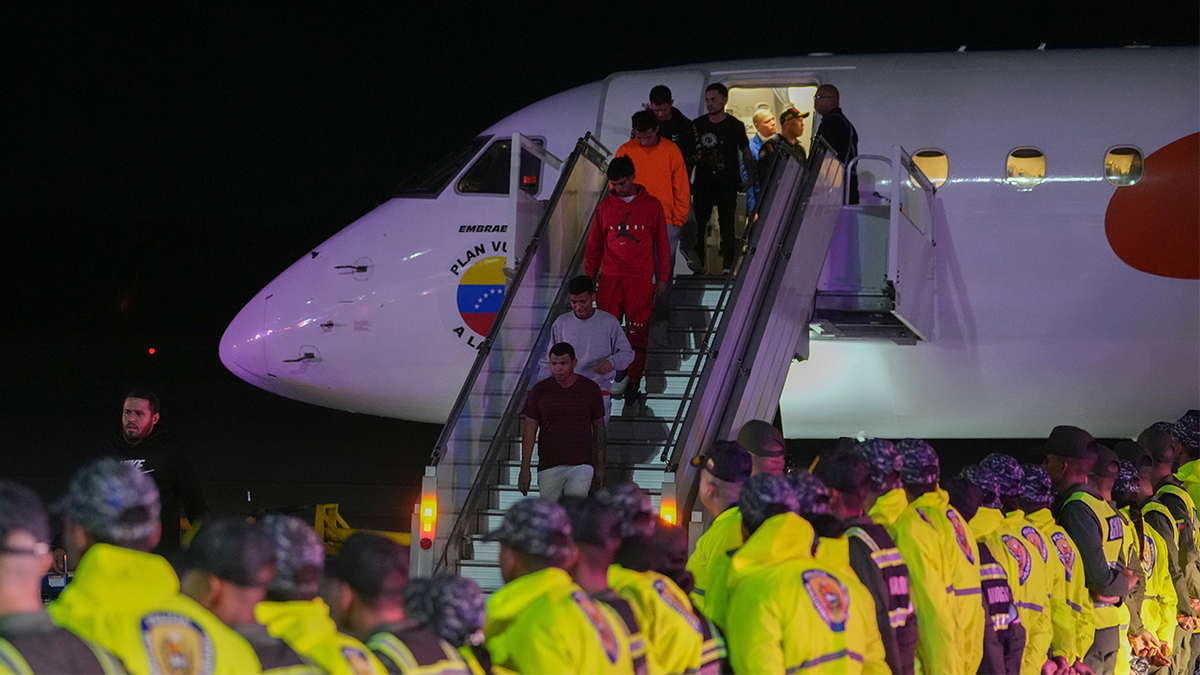
Venezuelans deported from the United States arrive at Simon Bolivar International Airport in Maiquetia, Venezuela, Monday, Feb. 10, 2025. (AP)
The Venezuelan government confirmed the flights earlier on Monday, criticizing in a statement the «ill-intentioned» and «false» narrative surrounding the presence of Tren de Aragua gang members in the U.S. The statement said most Venezuelan migrants are decent and hard-working people and that American officials are attempting to stigmatize the country.
The deportation flights on Monday came days after some illegal aliens were sent to the Guantánamo Bay, Cuba, detention camp, where they are separated from 15 detainees who were already there, including planners in the Sept. 11, 2001, terrorist attack.
A federal judge in New Mexico temporarily blocked the Trump administration from sending three Venezuelan men to Guantánamo Bay on Sunday. Lawyers for the trio argued that their clients «fit the profile of those the administration has prioritized for detention in Guantánamo, i.e. Venezuelan men detained in the El Paso area with (false) charges of connections with the Tren de Aragua gang.»
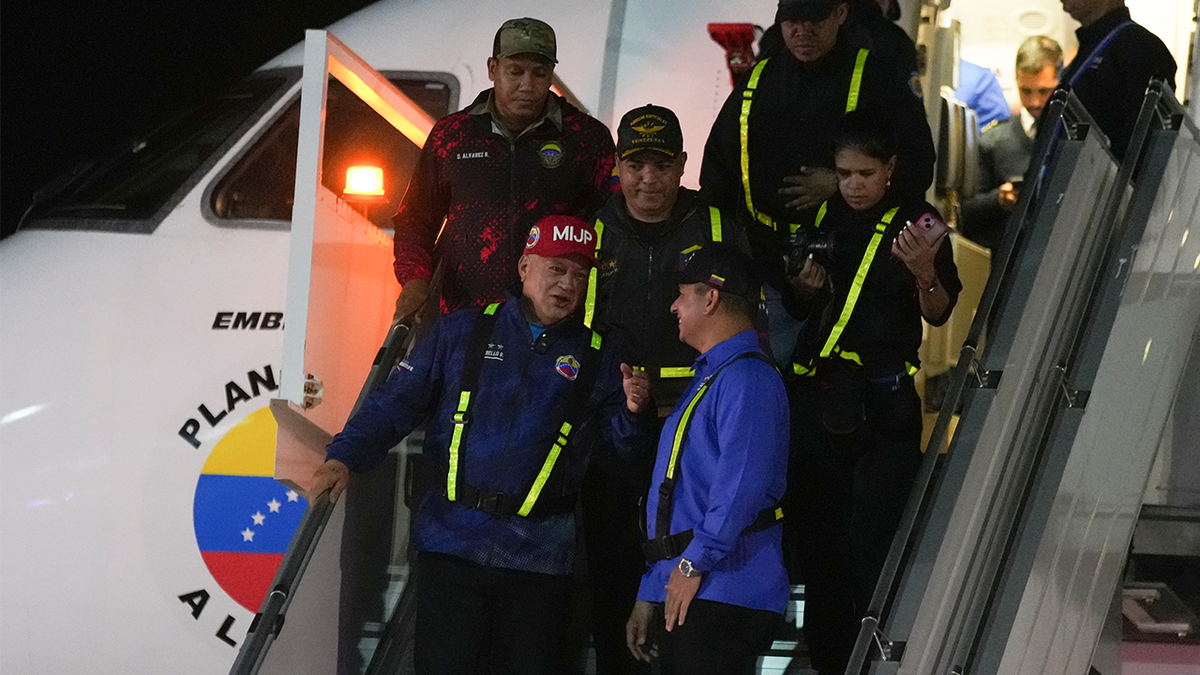
Venezuelan Interior Minister Diosdado Cabello, front left, walks off a plane that transported deportees from the United States at Simon Bolivar International Airport in Maiquetia, Venezuela, Monday, Feb. 10, 2025. (AP)
CLICK HERE TO GET THE FOX NEWS APP
The flights also came after Secretary of State Marco Rubio reached agreements with El Salvador and Guatemala for those countries to accept their citizens and U.S. deportees of other nationalities.
Trump said after Grennell’s visit that the Venezuelan government had agreed to accept «all Venezuela illegal aliens who were encamped in the U.S., including gang members of Tren de Aragua,» and pay for their flights home. Half a dozen Americans held in Venezuela were released at the time.
The Associated Press contributed to this report.
INTERNACIONAL
Trump’s Gaza relocation proposal sparks heated debate among Palestinians: ‘no life left here’

President Donald Trump’s suggestion that Palestinians should leave Gaza to rebuild their lives after months of war has triggered a wave of reactions, exposing deep divisions within the enclave and across the Arab world.
Speaking alongside Israeli Prime Minister Benjamin Netanyahu at the White House last week, Trump outlined his vision for Gaza’s future, describing it as «the Riviera of the Middle East.» His proposal to relocate 1.8 million Palestinians sparked outrage among Palestinian leaders and drew mixed reactions from Gazans.
While some Gazans have rejected emigration, others see it as their only hope.
«I’m asking Donald Trump himself to relocate us as he suggested. And I’ll be the first one to go,» one young man told the Center for Peace Communications team in Gaza during a camera interview. The man described his bleak reality, saying, «I want to leave because there’s no life left here. Life here is gone. I mean, just look around you.»
THE HISTORY OF GAZA AMID TRUMP’S PLAN TO REBUILD ENCLAVE
A view of the widespread destruction in Gaza, Jabalia, on February 5, 2025. (YOUSSEF ALZANOUN/Middle East Images/AFP via Getty Images)
Another Gazan called on neighboring Arab countries to provide an escape route. «To our brotherly Egyptian and Jordanian people and King Abdullah—we hope they open the crossing for the youth who are leaving, for the wounded, for the sick, and the elderly who need treatment.»
Jordan’s King Abdullah is set to meet with President Trump on Tuesday, having rejected his plan for annexing Gaza and displacing Palestinians, Reuters reported.
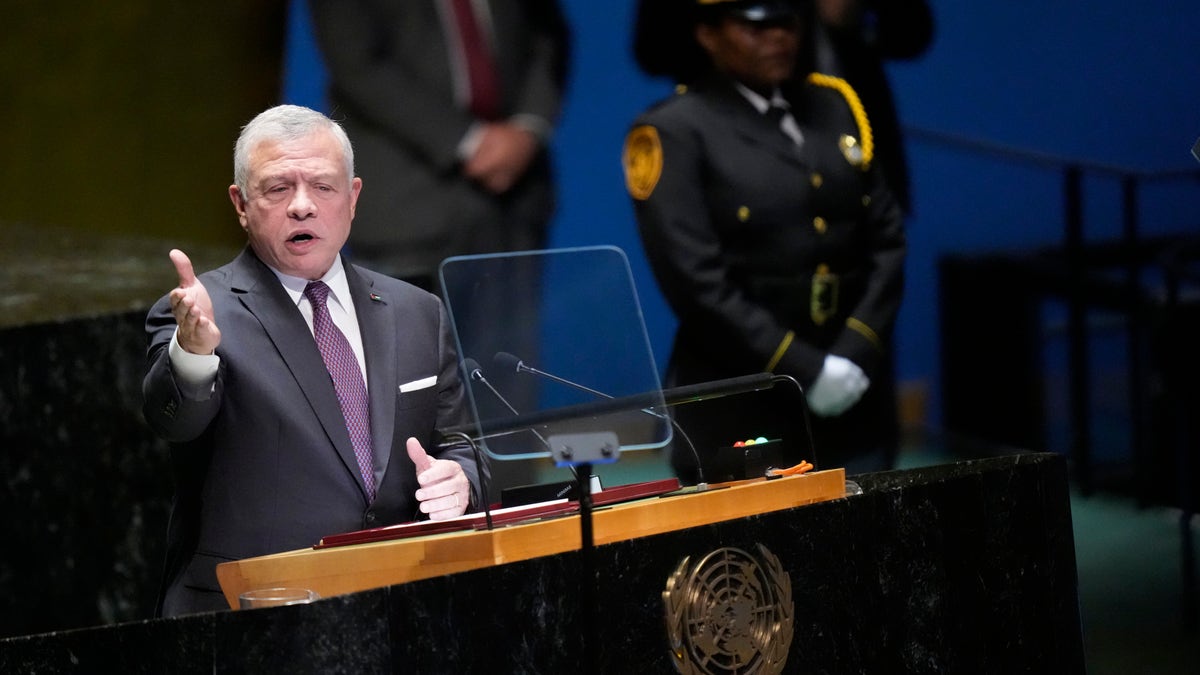
Jordanian King Abdullah meets President Trump on Tuesday having already rejected his plan for Gaza. (AP Photo/Mary Altaffer) (AP Photo/Mary Altaffer)
The Palestinian Center for Policy and Survey Research poll conducted before the October 7 terror attacks found that 31% of Gazans were already considering emigration—44% among young people. The most popular countries were Turkey, followed by Germany, Canada, the United States and Qatar.
The poll’s authors said, «The main drivers seem economic, political, educational, security and concerns about corruption.»
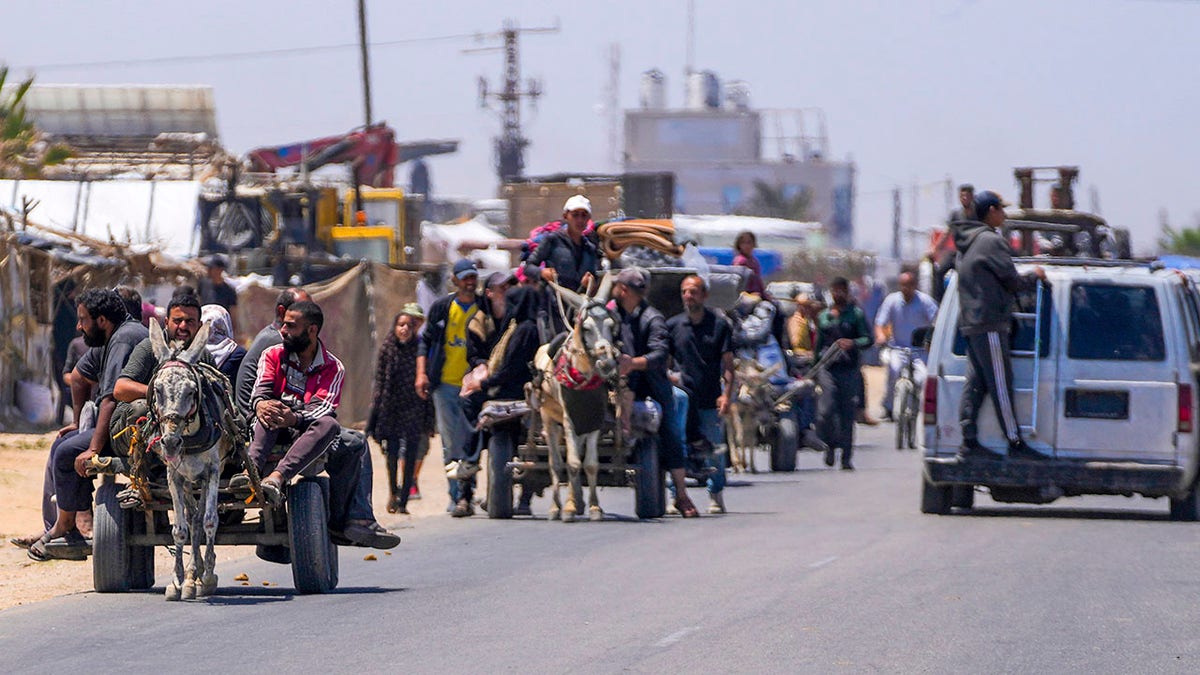
Displaced Palestinians arrive in central Gaza after fleeing from the southern Gaza city of Rafah on Thursday, May 9, 2024. (AP/Abdel Kareem Hana)
Joseph Braude, founder and president of the Center for Peace Communications, told Fox News Digital that the number has grown significantly due to the ongoing devastation. «Through our daily contact with Gazans from all walks of life across the coastal strip, we have seen that proportion grow, amid the destruction of the present war, to a substantial majority of the population.»
Ayman Khaled, a Palestinian journalist, echoed similar sentiments, pointing to the grim prospects for rebuilding Gaza after months of relentless Israeli bombardment. «Gaza will need to go through a very long period of reconstruction. In that long period of time, where will the youth go? Where will the wounded go? We have more than 100,000 wounded. Even before the last war, a stream of people were leaving Gaza—workers, students, business people. That’s how it looked then. Now, those trends will double. There is no hope for the reconstruction of Gaza, not in a year nor 10 nor 15.»
‘LEVEL IT’: TRUMP SAYS US WILL ‘TAKE OVER’ GAZA STRIP, REBUILD IT TO STABILIZE MIDDLE EAST
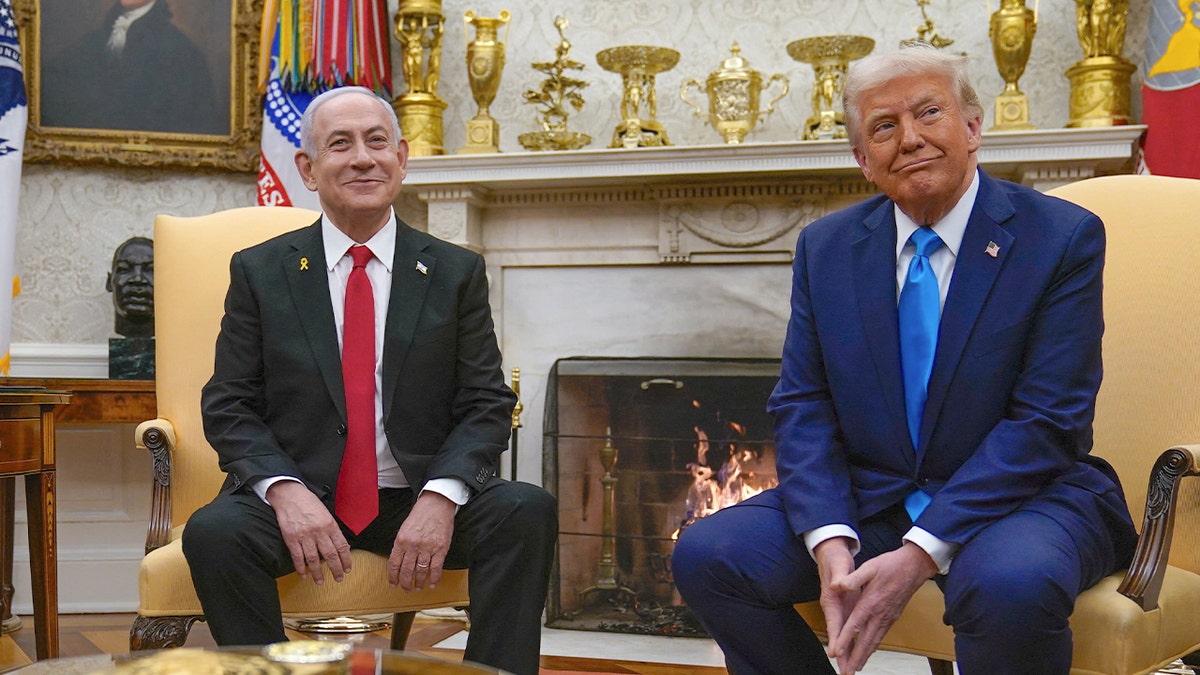
U.S. President Donald Trump and Israeli Prime Minister Benjamin Netanyahu meet at the White House in Washington, D.C., Feb. 4, 2025. (REUTERS/Elizabeth Frantz)
He also warned that as long as Hamas remains in power, cycles of violence will continue, pushing more people to flee. «If Hamas remains on the scene, this will keep happening. Every day, we’ll have new killings. After every battle, they say they are victorious—but what is this victory? If we don’t seriously address the issue of Hamas leaving the political scene, we cannot talk about anything else. If Hamas remains, people will emigrate, whether willingly or unwillingly.»
Hamas described Trump’s plan as a «recipe for creating chaos and tension in the region,» and for many Gazans, leaving is unthinkable. Speaking to The Associated Press, Mustafa al-Gazzar, a displaced Gazan, dismissed the idea of leaving. «You think you’ll expel me abroad and bring other people in my place? I would rather live in my tent, under rubble. I won’t leave. Put that in your brain.»
Amna Omar, 71, who has been sheltering in central Gaza, was equally defiant. «Gaza is our land, our home. We as Gazans… I don’t want to die in Egypt.»
Another woman in Deir al-Balah told Israeli news agency TPS-IL, «We clung to our destroyed homes and we clung to the soil of Palestine.» While voluntary emigration has been quietly discussed for years, Trump’s endorsement has turned it into a divisive issue. Arab governments, wary of being seen as complicit in Palestinian displacement, have been quick to condemn it.
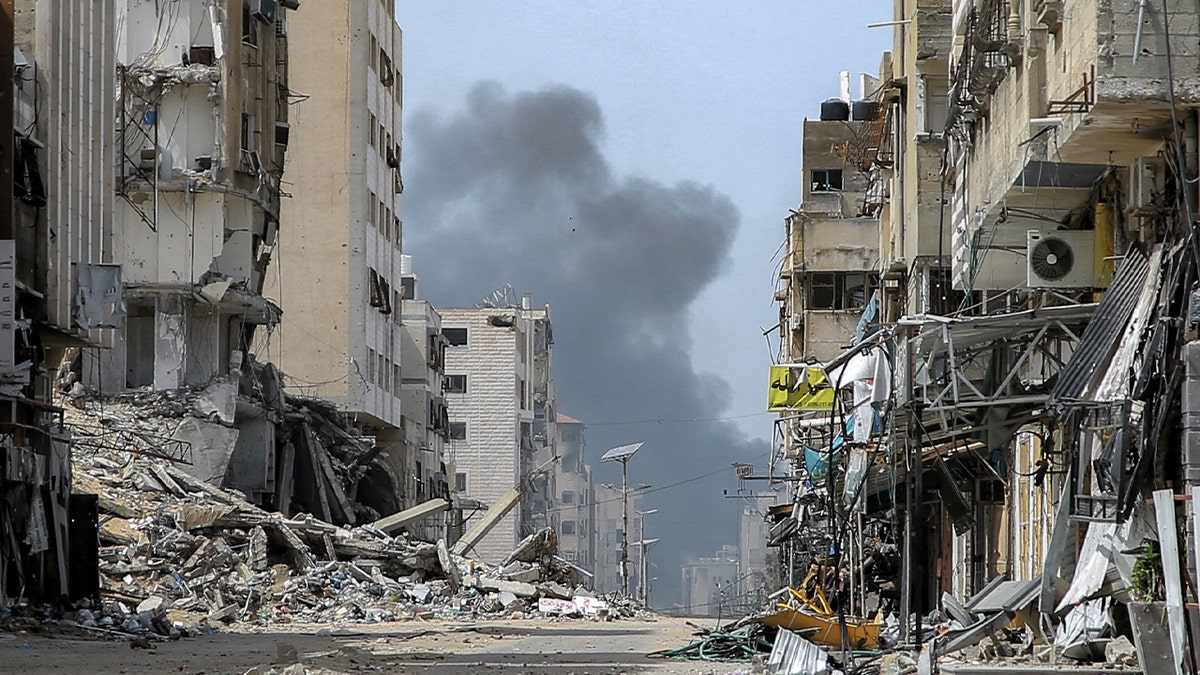
Smoke rises during an Israeli strike in the vicinity of the al-Shifa hospital in Gaza City on March 28, 2024 amid the ongoing conflict between Israel and Hamas terrorists. (AFP via Getty Images)
CLICK HERE TO GET THE FOX NEWS APP
However, with Gaza in ruins and no reconstruction in sight, the debate over emigration is no longer theoretical. The question is not whether Gazans want to leave, but whether they will have the opportunity to do so.
A Gazan man interviewed on-camera by the Center for Peace Communications said «In the end, people will accept reality. They’ll emigrate because they want to live. They want to live in a country that protects and supports them. A country where you can hold your head up high. If our country isn’t looking out for us, where should we go?»
Reuters and The Associated Press contributed to this article.
-
ECONOMIA3 días ago
Pelea por el atraso cambiario: Milei, enojado porque el FMI «no la ve» y lo presiona con una devaluación
-
POLITICA2 días ago
Javier Milei y sus medidas, EN VIVO: Elon Musk volvió a elogiar al Presidente y se declaró «gran fan»
-
SOCIEDAD3 días ago
«Más de 250.000 empleos perdidos: La crisis empresarial en Argentina sigue en aumento»
-
ECONOMIA1 día ago
Tarjeteo récord: desde la City alertan que la salida de dólares por turismo creció de manera «impresionante»
-
CHIMENTOS2 días ago
El testimonio que complica a Jorge Rial, el papá de Morena: «Un hogar con mucha violencia»
-
SOCIEDAD3 días ago
Incendios en la Patagonia: Chubut ofrece 10 millones de pesos para identificar a quienes iniciaron el fuego






















